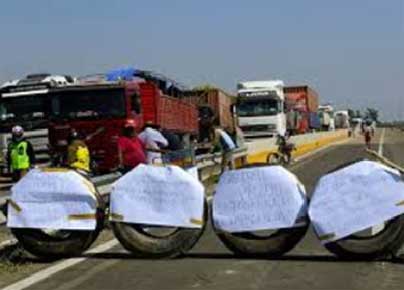Bolivian Banana Exports to Argentina Halted Due to Road Blockades
2024-06-14

The Cochabamba Chamber of Agriculture and Livestock has warned that the ongoing blockade on the route between Santa Cruz and Cochabamba is causing daily losses of up to 10 million dollars. Since June 7, various social sectors have been obstructing this road, demanding the construction of a road section in the Yapacaní municipality.
This situation, which producers describe as a "daily ordeal," reflects the frustration of sectors dissatisfied with the response to their demands, leading to road blockades as a pressure tactic. The statement adds that according to reports from the Bolivian Institute of Foreign Trade, Santa Cruz experienced more than 140 blockades in 2023 and Cochabamba more than 64 days. So far in 2024, Cochabamba has already accumulated over 45 days of blockades, not including incidents in other departments. As per the institution, Cochabamba serves as Bolivia's economic hub, facilitating a daily economic movement of 10 million dollars. Of this amount, 5.5 million dollars are attributed to foreign trade. An additional 2.5 million dollars are linked to logistics movement, and 0.5 million dollars to the movement of fruits, flowers, and other products from the Cochabamba tropics.
Moreover, the region handles a daily volume of over 4,500 tons of various products. In addition to disrupting the internal flow, the blockades pose a significant threat to the Argentinean market for banana exports. This critical sector could potentially face production unit closures and a surge in unemployment. The potential consequences of these blockades extend beyond Bolivia's borders, underscoring the issue's international implications. The impact of these pressure tactics is not limited to the economy but also extends to the region's social fabric. According to" the farmers, these tactics significantly impact employment and promote migration from rural areas to cities. Cochabamba's predominantly agricultural productive vocation, with more than 400,000 families working in this sector, is particularly vulnerable. The current blockades in Yapacaní and the threats of new blockades exacerbate the situation, jeopardizing food security and employment. This human aspect adds a sense of urgency and importance to the problem.
In conclusion, the Cochabamba Chamber of Agriculture urgently appeals to the competent authorities to" fulfil their constitutional role and ensure free transit. "We urge the authorities mandated by law to fulfil their constitutional role and grant us free transit to safeguard food security and employment," the statement concludes.









